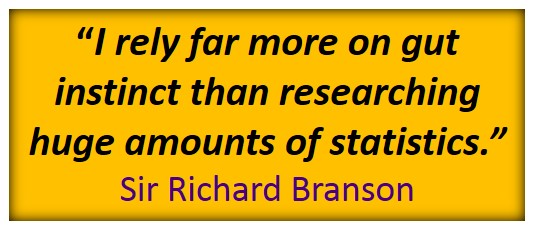 "Go with your gut"- we've all heard this advice before, but do we regularly apply it, or do you talk yourself into sorting through all of the facts so you can follow your head? We all know the battle between determining when to use our head or to let our gut lead the way. You are stuck between two choices, need to make a decision, or are at cross roads, and you desperately wish you had a crystal ball or psychic intuition to tell you what to do. Following our instincts so we can make better, smarter decisions, which lets your experience and expertise guide you, can help you to excel the success of your career and business. Did you know that about 50% of big decisions in businesses end with the gut?
"Go with your gut"- we've all heard this advice before, but do we regularly apply it, or do you talk yourself into sorting through all of the facts so you can follow your head? We all know the battle between determining when to use our head or to let our gut lead the way. You are stuck between two choices, need to make a decision, or are at cross roads, and you desperately wish you had a crystal ball or psychic intuition to tell you what to do. Following our instincts so we can make better, smarter decisions, which lets your experience and expertise guide you, can help you to excel the success of your career and business. Did you know that about 50% of big decisions in businesses end with the gut?
As said in “The Neuroscience of Trusting Your Gut” by Drake Baer, "Why should you trust your gut? Because science says it's the foundation of rational decision making...gut-thinking is a good idea." Here's more..."Rather than being opposed, emotion and reason are deeply interrelated: if you're going to make sound and rational decisions, [Antonio Damasio, a neuroscientist at the University of Southern California,] contends, you need to have first done prior accurate emotional processing. If you have done such processing, then your emotions accelerate your decision-making--in the form of intuitions, hunches, and gut feelings.
A hunch is a somatic marker: a physiological clue of what to do next. When you're anxious, you might feel tense in your back, when you're content, your shoulders and your hips might relax accordingly. So when you're making a call about a future decision, these physical sensations guide (or bias) you toward or away from certain actions."
Since emotions and past experience combine to create our gut instincts, what can we do to listen to and follow this instinct rather than to waste time pouring over mounds of data and facts? We need to master listening to our body; we need to tune into the physical sensations our body gives. Here are tips from "3 Ways Your Gut Instincts can Guide You," by Nancy Napier:
- A Decision-Making Guide. Choose a situation in which you're wavering between two choices. Choose one side/decision, what happens in your gut? Do you feel a tightening, a gripping? Softening, spaciousness, warmth? Are the sensations pleasant or unpleasant? Now notice your thoughts about the move—are they generally positive or negative? Give yourself some time to feel your gut and mind responding. Now shift to the other side of the issue. As before, notice how your gut is feeling and what kind of thoughts well up. You may not get a definite answer at first, but if you come back to your body with the question a number of times, you'll likely develop a solid gut sense of which decision is right for you.
- A Danger Radar. Your gut feelings can tell you quickly and clearly whether a person or situation is good or bad for you, but you may need some help tuning in. Remember a time when you came away from an encounter not feeling great about it, or yourself, but with no real clarity about why. Notice what happens in your body now when you think about that experience. Check in with your gut first, then your shoulders, arms, legs, and any other part of your body that calls your awareness. Are you tense or relaxed? Do you feel comfortable or uncomfortable? Take some time to let your physical sensations register, and notice what they tell you about the person or situation, and about how you were affected.
- A Stress Detector. Your gut is a brilliant barometer of stress. This exercise is simple: Just allow your focus to settle deep within your abdomen. Is your gut quiet or active? Open or clenched? Soft or tense? Spacious or tight? If you're tight, gripped, or clenched, you're probably dealing with some kind of stress. As with all skills, learning to listen to—and trust—your gut may take practice, but over time you'll discover a valuable and reliable guide.
Tune in to all of this information so you can determine when you may need to override your brain so you can follow your gut feelings. In business, we are faced with many decisions - personnel, customer, product, and more - and many factors affect judgment and what we decide. Clearly, now you well know that professional decisions don't always have to be based upon facts. Trust your gut. And when the gut and head are aligned, these decions will feel and think right.


